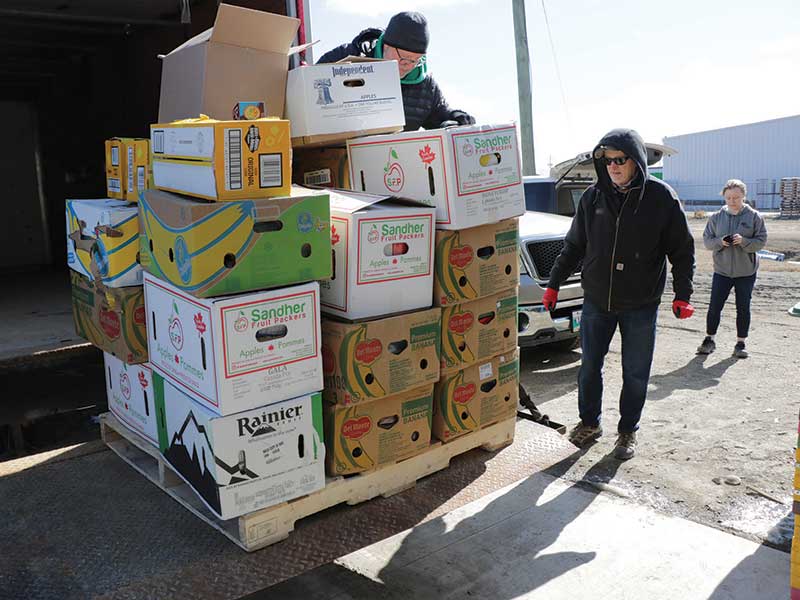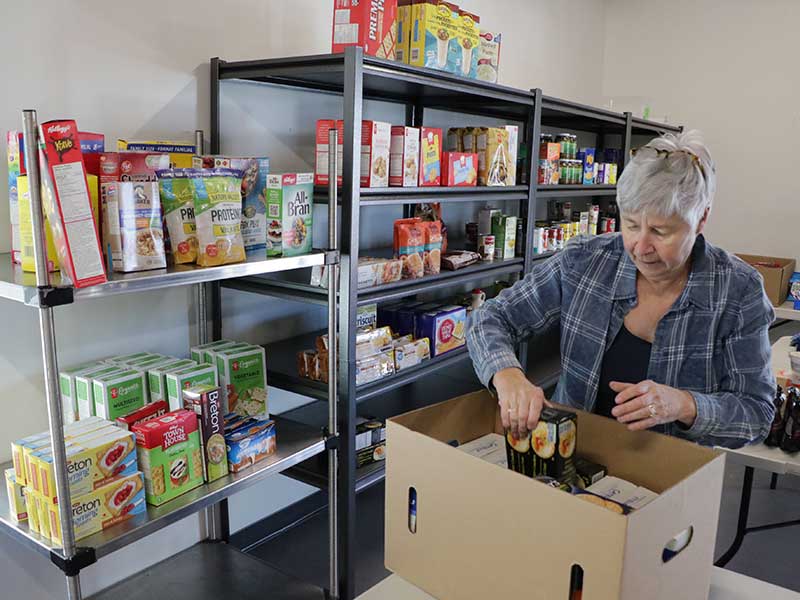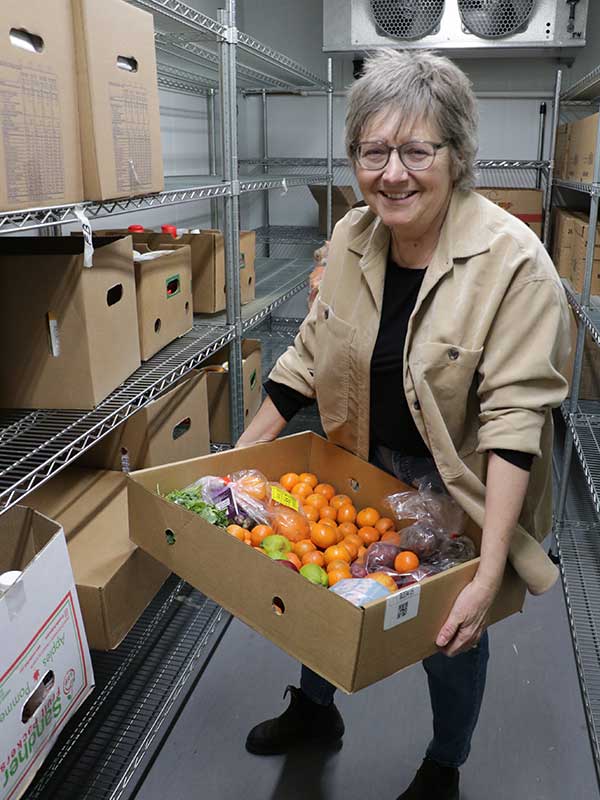Winkler’s Food Rescue program is putting unsaleable groceries to good use
It’s just after lunch on a Tuesday and the back room of the Winkler and District Food Cupboard is hopping.
Earlier, teams of volunteers made the rounds to all the major local grocery stores, and now they’re unloading the day’s haul—several pallets piled high with dozens of boxes of food.
Inside, yet more volunteers descend upon the pallets as they’re brought in, sorting everything to ensure fridge and freezer goods are quickly put away and the other items are placed on their designated shelves.
Local businesses have always been generous to the food cupboard, sending unsold grocery items their way when they could—unused buns from barbecues, seasonal goodies after the holidays had passed, excess bags of potatoes, and so on—but it’s only within the last handful of years that a dedicated Food Rescue program, complete with its own team of volunteers, has been up and running, headed up by coordinator Phyllis Kroeker.
As a public health nurse, Kroeker saw firsthand the food insecurities many families in our community face.
“Because you’re working with those families and seeing the need, it was on my mind,” she shares. “You hear of these stories about people going into dumpsters—they know when certain grocery stores are emptying their coolers and people would dumpster dive for yogurt or dairy.”
After retiring in 2019, Kroeker started reaching out to Winkler stores to see if there was a more organized way to put their shrinkage—items that are taken off the shelves because they’re at or nearing their best-by dates or because they can’t be sold due to minor packaging damage—to better use.
They began weekly scheduled pick-ups from the Winkler Co-op grocery store in early 2020.
“We went to collect that first time and we were like kids on Christmas Day,” Kroeker recalls. “There was so much food and it was just such goodness. We haven’t looked back since.”
Today, Food Rescue volunteers collect grocery donations weekly or even multiple times a week from Co-op, Real Canadian Superstore, and Walmart. Shopper’s Drug Mart has items for them once or twice a month as well, and smaller businesses like Sunny Day Products and the Buttercup Greenhouse & Cafe are also regular donors.
It results in a dizzying variety of food—fruits and vegetables, frozen goods, lunch meats, canned non-perishables, bread products, drinks, and even snacks—being donated throughout any given week. There’s thousands of pounds of food coming in every month.
“We follow guidelines for food shelf life,” Kroeker explains, noting plenty of items last weeks and even months past the dates stamped on their packaging. “This stuff is all still edible. It’s still safe. It’s just stuff that, for whatever reason, they just can’t sell.”
The Food Rescue program works in collaboration with both the Central Station Community Centre and the Winkler and District Food Cupboard to find a use for all this food, and there’s certainly plenty of takers.
Both partner agencies use the donations in their own programming—the community centre offering free meals and snacks to patrons and the food bank distributing hampers to help families in need make end’s meet.
But there’s so much rescued food that even these two organizations can’t use it all, and so the Food Rescue team has branched out, sending items regularly to support the breakfast programs in local schools, to both the Winkler and Morden family resource centres for snack breaks, to Genesis House to help feed the victims of domestic violence staying in the shelter, and to Gateway Resources for use by its clients. They’ve also partnered with food bank programs in Carman, Altona, and the Sandy Bay and Roseau River First Nations. (Check out next week’s edition of the Voice to see how a few of these organizations are putting the food they receive to use).
‘No waste, no hunger’
Food Rescue’s motto, Kroeker shares, is simple: no waste, no hunger.
“That comes straight from Second Harvest,” she says of the national food rescue program the Winkler initiative draws inspiration from, making use of its app to connect with businesses that want to make food donations.
“It’s very simple, but to me that’s what it’s all about,” she says. “No one in our community should be hungry.”
It’s that thought that keeps the program’s dedicated volunteers coming back week after week to do their part.
“It’s just really surprising how much food actually has been going into the dumpsters over the years,” observes Linda Wiebe as she sorts through items to be placed on the food rescue-designated shelves at the food cupboard, which are where patrons are able to pick and choose what products their families will most enjoy above and beyond grocery staples.
“The landfills do not need our food,” stresses Colette Muchowski as she sorts through the day’s request sheets from the various school breakfast programs. “It’s not like it’s garbage. It’s all perfectly fine. Let’s put it to use.”
“It’s just fantastic the things that can be offered to people that move here, lower income families. It helps them out immensely,” adds Kathy Friesen, at work at the sorting table as the pallets are rolled in. “It’s so generous of those who donate.”
“We do try to give as much as we can”
Co-op food division manager Cam Buhler shares that the push to find a better use for unsaleable food products actually started in their Morden grocery store, later coming over to the Winkler one as well.
“We pull stuff off the shelf, but it doesn’t mean that it’s garbage—it could be a spot on an orange or an apple or maybe a wrinkled pepper or something like that. It’s still good.”
Over the years, they’ve found various uses for the bruised fruits and veggies (cutting it up for use elsewhere in-store or turning it into saleable compost) and for expiring bread products (turning them into bread crumbs or giving them to local hog farmers for the animals), but also began sending some of it to the food banks in Winkler and Morden for broader distribution. They do the same with other products being pulled off the shelf due to slightly battered boxes or nearing best-by dates.
“Stuff like fresh bread, fresh meat, when it comes close to the best before date, we put it in the freezer and we give it to them,” Buhler says, observing best-by windows have been growing ever smaller—owing more to market pressures than actual food quality issues—causing stores to remove perfectly good food from their shelves much earlier than in the past. It all adds up to a lot of potential waste.
“In a year between the two places here, so Many Hands Resource Centre [in Morden] and Central Station, last year we gave about $200,000 worth of food,” Buhler shares. “We do try to give as much as we can. We give whatever they can handle. If they came every day, we’d probably have something for them.”
Seeing food that most certainly still has some life in it finding its way to people who can use it is heartening for Buhler.
“We want to help. We’re community-minded. If they can take stuff that we can’t sell … if we can give it away and help somebody with it? I don’t know how many meals $200,000 makes, but that’s a lot of people.”
While Winkler’s larger grocery stores are the heavy-hitters when it comes to donating to Food Rescue week in and week out, the program gets a helping hand from a number of smaller businesses as well.
Sunny Day Products has been sending its unsold bakery items the program’s way for over a year now.
“We had some leftover breads and baked goods and whatnot and we inquired about it to see if they could have some use for it,” recalls co-owner and general manager Ben Plett. “We know that Central Station does a lot of good work in the community, and there is a lot more people in need, I think, than what meets the eye.
“When you think about bigger cities, Winnipeg or whatever, and you look at the homelessness there, it’s also happening in our own community. And there’s a lot of families that can’t afford groceries,” Plett says. “We didn’t want to throw it out if someone could make good use of it.”
It’s a sentiment echoed by Buttercup Greenhouse & Cafe owner Susanne Krahn. Her restaurant just north of the city has also found a home for its unsold baked goodies with the Food Rescue program.
“We never use day-old bread—we bake fresh bread every morning—and we do have weeks where we’re not very busy, and so then it accumulates pretty quickly,” she says.
They realized their dilemma soon after opening their doors last spring, and reached out to Central Station and Food Rescue to find a solution.
“It’s homemade bread and, honestly, it’s just too delicious [to throw away],” Krahn says. “So we call them about once a week to pick up bread.”
Krahn knows what it’s like to struggle to put food on the table; this is her way of paying forward the kindness her own family was shown.
“I grew up getting a lot of help with food and things from our community at the time, and it’s never left me, I guess,” she shares. “That feeling of getting fresh food from someone is huge.”
She urges other local restaurants and stores to take a look at what food they’re throwing away and see if it could perhaps be put to better use.
“Yes, there’s times where you think about it, that all this bread is going out and we’re maybe not profiting from it. Times are tough. But at the same time, within a day you forget about it because you realize it’s for a good cause. It’s helping people.
“To have a trustworthy organization who are able to just distribute it to whoever needs it, is really great,” Krahn continues, reflecting on all the moving parts it takes to make this program a success—donors, volunteers, community groups eager to get reclaimed food to where it can do some good “We live in a very giving community.”
That generosity is what makes the Food Rescue program work, agrees Kroeker.
“The support we get is incredible.”
She eager to see how the program might continue to grow in the years ahead, and she encourages local businesses who want to discuss how they can be a part of it to get in touch with her through Central Station.
“Reach out. Let’s have a conversation.”
Check out next week’s Voice for part two of our coverage on the Winkler Food Rescue program to see how all this reclaimed food is being put to use in our community.


